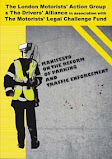Telegraph
23rd January,2006
by David Millward
Town halls are illegally using motorists as a cash cow by flouting government guidelines and turning parking control into a money-making business.
While Whitehall insists that local authorities should use their powers only to improve traffic management, increasing numbers of motorists are finding that town halls see parking as a multi-million-pound source of revenue.
This is despite the efforts of the parking industry to improve its image while satisfying the demands of local authorities that employ them.
An investigation by The Daily Telegraph has uncovered an array of abuses.
They include the issuing of thousands of illegal parking tickets, many of which are quashed on appeal. Some contractors have set "benchmarks" for the number of penalty charge notices that each attendant should issue on their shifts.
On occasions fines are increased substantially when collection is handed over to debt enforcement agencies that obtain county court judgments against motorists who are unaware that any "hearing" has taken place.
While the biggest problems are in London - where local authorities have been responsible for parking control since 1994 - motorists elsewhere are now starting to face similar treatment.
There are 144 councils outside the capital that have been given the power to police parking within their area and the Department of Transport is considering applications from a further 18.
According to Edmund King, the executive director of the RAC Foundation, complaints about parking enforcement are directly linked to the process of "decriminalisation" - handing over enforcement to town halls.
"We have had a lady in Norfolk whose pay and display ticket fell off the windscreen because of condensation and she was issued with a ticket. She was able to prove she had paid, but the council refused to quash the ticket," he said.
Other incidents include a woman being issued with a penalty charge notice because she had not returned to her car from the pay and display machine quickly enough.
Earlier this week the National Parking Adjudication Service, which handles appeals against parking tickets, singled out Bristol for criticism after a motorist's car was towed away because the driver had underpaid a parking fee by £1.50.
Motorists can appeal to an independent adjudicator, but lose the 50 per cent discount for swift payment.
While contractors maintain that incentive schemes linking parking attendants' pay and job security to the number of tickets issued have been scrapped in recent years, some examples remain.
The Transport and General Workers Union is in dispute with Central Parking Systems, the contractor in Hackney, east London, over a proposed bonus scheme that depends on the number of vehicles clamped.
Last year a central London industrial tribunal was told that a parking attendant in Kensington was expected to issue 1.4 tickets an hour. Delivery drivers and courier drivers have complained of wrongly being issued with scores of parking tickets.
In December the House of Commons Transport Select Committee was told that Tradeteam, which delivers beer, successfully appealed against 1,039 parking tickets in 2004, saving itself £70,000.
Tony Scott, 46, a courier in London, has received about 100 parking tickets over the past two years. All except one were quashed on appeal.
Other complaints in London include the number of judgments entered against motorists at Northampton county court on behalf of 33 London authorities. In 2003-4 the figure reached nearly 875,000.
One of those to fall foul of that court was Tom Conti, the actor. "I was given a parking ticket and you could not read the registration number of the car," he said. "I contacted Camden council."
His initial challenge was rejected. "At the beginning of this year I received something saying judgment had been entered against me at Northampton county court.
"I was not told a hearing was taking place. It is amazingly Stalinist." With additional costs, his parking fine had reached £390.
Keith Banbury, chief executive of the British Parking Association, admitted that public confidence in his industry was low and called for fundamental reforms in the contracts agreed between contractors and councils
Tuesday, January 24, 2006
Subscribe to:
Post Comments (Atom)
Blog Archive
-
▼
2006
(392)
-
▼
January
(23)
- Firefighters reject plans for single 999 centre
- End of the Pinta?
- Comments to the Sunderland Council Committee: Crim...
- Sunderland Case may throw a spanner in the nationa...
- Another Victory: Carlisle City Council quashes ticket
- Press Release: Sunderland MP Drawn into Parking Row
- Thirty Six Days and Counting
- Save the whale? It'll cost you a ticket
- DPE Scam exposed. National implications.
- Maori Spokesman contacts the No Campaign
- Sandwell Council Parking Office takes the pee
- Town halls defy law to milk millions from parking ...
- Chance of Mayoral Elections in Sunderland
- City sees stirring of Political Revolution
- Are the rats preparing to leave the Sunderland Tit...
- NCP Mole reveals fear amongst Parking Attendants
- Parking fines pass the £500,000 mark
- The way thousands of drivers can avoid paying park...
- Labour MP Bill Etherington does some work...well, ...
- Newcastle Council avoids 'fine mess' in Parking Ti...
- Restauranteur wants lower parking fines for busine...
- Tories vow not to fly Euro flag alongside Union 'J...
- Changes ordered after parking ticket chaos
-
▼
January
(23)


No comments:
Post a Comment